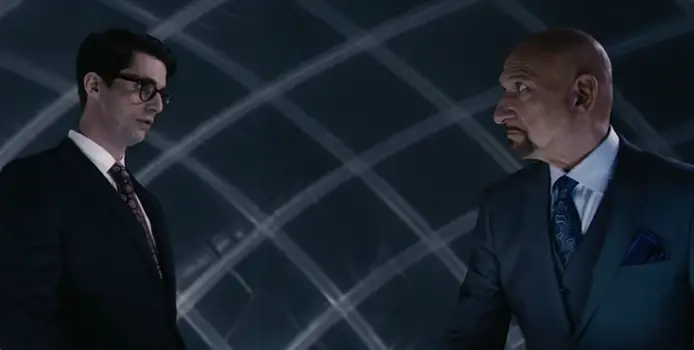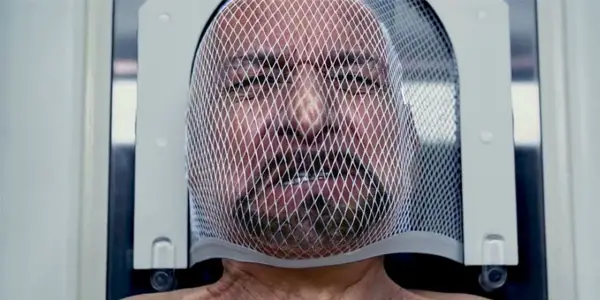SELF/LESS: A Cinematic Dud

Alex is a 28 year-old West Australian who has a…
I’ve been toiling over this review for about a week now. A large portion of mainstream film criticism has shifted towards tearing down films, blatantly nit-picking all aspects of a movie and continuously shouting nasty adjectives which seemingly constitutes as a review of a film. I get why it’s so big nowadays, being angry at or disappointed in something will always get a more humorous and memorable responses. The audience loves to witness people embracing their over-encumbering attitude, removing any tact or politeness, allowing us to furiously state basic opinion without reservations, a release from modern day politeness.
So why am I bringing this up? Because this film is incredibly stupid and that’s the reaction it evoked from me. It’s a film where I walked out and kept thinking about, but not in a good way. It fills you with questions, but not the type that the filmmakers intended. They wanted me to question my morality and how far is too far when it comes to science, instead I question most plot elements and how none of them seemed to connect in a logical manner.
It’s a film which has an incredibly sub-par script which wasn’t worked on hard enough, not read by enough people and seems like it has been rushed on-screen in order to occupy empty matinees. No one making this film seems to care. The actors don’t. The directors doesn’t. I know the script-writer doesn’t. So why review this film? I don’t want to nail a single point repeatedly into the ground, but I have to say this again: this film is stupid. It’s quite a blunt way of saying this, it’s not intelligent at all. I get it. But it’s the best way of saying it. I know a film has problems when the title has zero to do with the film.
That Pesky Plot
Self/Less tells the story of billionaire Darren Hayes, played by Ben Kingsley, who is doing his best Al Pacino impersonation. Right off the bat I noticed a problem in the film, when the usually reliable Ben Kinglsey seems completely dazed and never really connecting with any other character in the film. Whenever he has a talk with someone who looks distracted, probably gazing at that delicious croissant at the catering table rather than Victor Garber’s inane dialogue. Hey, I would too. So Darren Hayes has cancer and has gotten into contact with a shady company led by moustache-twirling antagonist Professor Albright (Matthew Goode, an actor who hasn’t had a good role since Watchmen, unfortunately) who offers him a pretty sweet deal, through a process called “Shedding”, Hayes can ditch his current failing body and be essentially reborn in a much younger body.

Hayes toils with the idea, which leads into the subplot of Hayes’ broken relationship with his daughter, Claire Hayes (Downton Abbey’s Michelle Dockery). A businessman who has relationship problems with his children? Boy I haven’t seen that before. Don’t worry, it plays out exactly the way you think it will. So due to his daughter’s rejection, Darren sheds into the body of Ryan Reynolds. Life’s pretty sweet, but when flashbacks start to flicker, suggesting that this new body is an actual human (rather than a manufactured organic one), Darren starts to find the truth about who’s body he’s exhibiting and what Albright’s company is really up to.
The first annoying part about the film is that whilst it has elements of older films such as John Frankenheimer’s Seconds and Duncan Jones’ Source Code, the film doesn’t exactly fulfil the potential of that plot line. The dark nature of using someone else’s body in expense of fulfilling your lost youth and the moral decision that would create, whilst also commenting on the very nature of this science and where ideas like this could lead to, the film kind of forgets about all that, shaping the film into a Bourne-esque action narrative, filled with unwilling female companions, firefights and car chases.
Many Tools Gone To Waste
The most interesting aspect of this film is that it is directed by Tarsem Singh. Singh is quite an interesting director, making films which trigger quite visceral responses in people, due to his trademark visual style, favouring outlandish visual excessive over story, famously exampled in such films as The Fall, Immortals and The Cell. The Fall is Singh’s best film, balancing interesting visuals with a heartfelt story, anchored by a great performance by Lee Pace. Self/Less only has brief flashes of his style, with such highlights being Darren’s gold-filled mansion and some interesting montage sequences at the start of the film. Once Ryan Reynolds takes over the film, Singh’s style fades away and he seems to just be directing a typical action film. It has the feelings of a director-for-hire gig, as a film with a flimsy script like this could’ve really been helped by some trippy visuals (some freaky stuff is thrown into the flashback sequences but aren’t enough to redeem itself).

During the start-up sequences of Darren in Reynolds body adjusting to his new life, he is sent to New Orleans and takes in the local culture, which features a couple of quite entertaining if fleeting montages set to the colourful New Orleans jazz music, which adds some great energy to the film, but once the film leaves New Orleans, all that energy goes with it too. A fun idea would’ve been to keep the film contained within New Orleans and maintain that soundtrack, it could’ve propelled itself with a bit more energy and been a lot more likable.
The action sequences are shot fine, but don’t feature anything new. For a mainstream American action film, it’s refreshing to see gunfights and hand-to-hand combat which don’t use shaky-cam and have some creative uses of the environment. Singh isn’t shy of pulling his camera away or trying to hide bad film-making, so the action scenes are entertaining enough, even though they never really contribute anything worthy on a story-telling level. They seemingly exist to be bring the audience back during the dull conversation scenes, but don’t combine story and action which many great action films do (for a great example of this, watch Kingsman).
Wait…What was that?
These scenes highlight one of the script problems, which is how a 86 year old billionaire, just because he has Ryan Reynolds body, is a master marksman and fighter. These are things that you learn, so really he should be an awful fighter, he’s had zero experience with any of this before. The film doesn’t explain how he’s so good or willing to kill people on the spot without hesitation, it’s glossed over (like a lot of the story problems in the film). A film about Ryan Reynolds being really clumsy due to having an 86 year old billionaire trying to be a bad-ass is another idea of a cool film which would’ve been interesting to explore and really mine for comedic material and build a character arc around it.

At the end of the day, this is a film which thinks it’s smart. The film is a bad magician tangling with his props: he’s trying to pull the rabbit out of the hat but you already see the wiggling lump within the top hat. Several ‘twists’ are distributed throughout the film, but they only reveal conclusions that the audience was already onto way before then. The truth behind the identity of Professor Albright’s character is so telegraphed I assumed we were meant to know who he really was when we first met him. This is not a case of being too smart or pretentious whilst watching the film, it’s the film’s fault of leaning on too many predictable reused tropes which we’ve all seen in other sci-fi action films and not creating dynamic enough characters for me to care about where they are currently at in their journey or how they end up.
Without spoiling anything, the film reveals a plot twist about Victor Garber’s character, which is a plot device that comes out of nowhere without any setup or explanation. It’d be like if in The Sixth Sense, the whole opening scene of Bruce Willis being shot was removed, so when we learn that Bruce Willis was dead the entire time, you’d be like “Wait, what?” and the film faintly whispering, “Oh yeah, he got shot once ages ago” without any context or backstory for it. It’s simply mind-boggling and just highlights how lazy the script feels and how people should’ve really given it a second read through.
I’m Not Angry, I’m Just Disappointed
I hope that Tarsem Singh is able to make a great film after this, he’s a talented visual director, a man with a good eye for digital photography but without Zack Snyder’s sophomoric sensibilities to go with it. Self/Less is a disappointing film, it’s not badly made, with the cinematography, music and acting all on an acceptable level. It’s just that the script is severely lacking and undercutting the film at every possible angle. Without Tarsem Singh’s signature film style to back it up, it seems a waste of his time when really, any B level out of work director could’ve constructed a film on a same level with the same amount of talent attached. Self/Less is a film which is watchable to a degree, if you ignore the overall plot and have it on in the background. The two hours it took from me could’ve been used to a much better degree, such as watching Seijun Suzuki’s Gate of Flesh or going outside and enjoying life. Or anything else really.
Unlike Self/Less, Can you think of any great sci-fi films which really used their premises well?
(top image source: Focus Features)
Does content like this matter to you?
Become a Member and support film journalism. Unlock access to all of Film Inquiry`s great articles. Join a community of like-minded readers who are passionate about cinema - get access to our private members Network, give back to independent filmmakers, and more.













